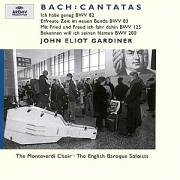Gardiner Reveals!
Andrew M. Klein | Washington, DC USA | 02/09/2002
(5 out of 5 stars)
"Gardiner's choral conducting needs no introduction: he is simply the very best. Here, as in most of his other recent recordings of Bach's cantatas, he elicits beautiful singing and playing from his forces, breathing new life into these masterpieces. BVW 125 contains an amazing revelation (about which I've heard nothing before -- but perhaps I've been inattentive): Gustav Mahhler built the Der Abshied segment of Das Lied von der Erde on the "Ich will auch mit gebrochnen Augen" aria in this work! I knew that, before composing Das Lied, Mahler was restudying Bach, but I had no idea how closley he modelled the most moving part of Das Lied (the Der Abshied melody motiff, harmony, voicing and tempo)on what Bach wrote long before him in this aria. Amazing stuff!"
Great recording
Teemacs | Switzerland | 01/12/2008
(5 out of 5 stars)
"This is another of the DG cantata CDs, released before the big falling-out between Gardiner and DG, that was actually recorded on the Pilgrimage (Christchurch Priory Church, Dorset, very much home territory for JEG).
The big hit here is the beautiful cantata for solo bass BWV82 "Ich habe genug", with its gorgeous aria "Schlummert ein, ihr matten Augen". The performances are crisp, clear and well-executed. At the Amazon price, this is a bargain."
Moving music with a message.
Andrea F. Biondo | Earth | 10/09/2007
(5 out of 5 stars)
"This is moving stuff, though I suggest listening to this recording in a slightly different order, Ich habe genug (tracks 6-10 first), then Mit Fried und Freud ich fahr dahin, (tracks 11-17), then Erfreute Zeit im neuen Bunde (Tracks 1-5) last. Ich habe genug is just sublime. It carries a message to us all, 'I have enough' (approximate translation). Bach was speaking for his time, with a religious perspective (making sure his bills got paid too), but today- I think a secular contemporary meaning can be derived. That is, to quote a more recent expression of wanting deliverance from 'the suffering of desire' (to take a slightly Buddist perspective), "I Do Not Want What I Haven't Got", (Sinead O'Connor 1990). After listening to Ich habe genug, it is difficult to not feel like there is nothing else I need in life but the beauty of such music."


 Track Listings (17) - Disc #1
Track Listings (17) - Disc #1